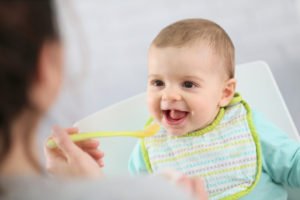According to a new report, significant levels of lead might be hiding in your child’s baby food. The Environmental Defense Fund analyzed 11 years of federal data and found
detectable levels of lead in 20% of 2,164 samples of baby food.
Dr. Aparna Bole, pediatrician at University Hospitals Rainbow Babies and Children’s Hospital in Cleveland explained, “Lead can have a number of effects on children and it’s especially harmful during critical windows of development. The largest burden that we often think about is neurocognitive that can occur even at low levels of lead exposure.”

The samples were not identified by brand, but the toxic metal was most commonly found in fruit juices, root vegetables and cookies or teething biscuits
While the levels are thought to be relatively low, no safe lead level in children has been identified.
The Environmental Protection Agency estimated that over 5% of children consume more than 6 micrograms of lead per day in their diet – the maximum daily intake level set by the Food and Drug Administration back in 1993. Environmental Defense Fund chemical policy director Tom Neltner found that food is the major source of lead exposure in two-thirds of toddlers.
Lead may be making its way into the food through contaminated soil, but Nelner believes that processing may be playing a role as well. “I can’t explain it other than I assume baby food is processed more,” he said.
According to an FDA statement, “The FDA is continuing to work with industry to further limit the amount of lead in foods to the greatest extent feasible, especially in foods frequently consumed by children. The agency is in the process of reevaluating the analytical methods it uses for determining when it should take action with respect to measured levels of lead in particular foods, including those consumed by infants and toddlers.”
Dr. Aparna Bole explained, “Avoiding all sources of exposure of lead poisoning is incredibly important … but the last thing I would want is for a parent to restrict their child’s diet or limit their intake of healthy food groups.”
She added that limiting or eliminating fruit juices from children’s diets is often recommended by pediatricians for nutritional reasons, but she doesn’t recommend that parents cut out root vegetables. “The benefits of those nutritious foods far outweigh any risk,” she said.”
Percentage Of Food Samples Containing Lead
- Grape Juice, baby: 89%, regular: 68%
- Apple Juice, baby: 55%, regular: 25%
- Carrots, baby: 44%, regular: 14%
Watch the video below for more information:
Learn how to make your own baby food in the video below: